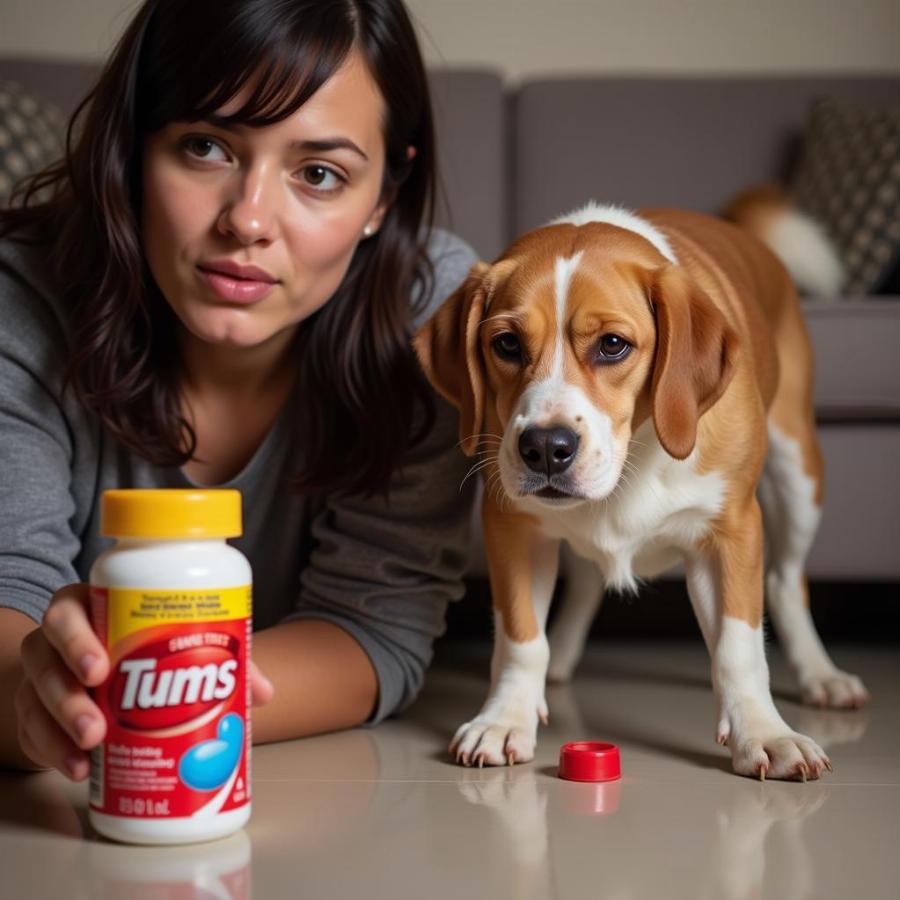If your dog ate a Tums, you’re likely worried. This article addresses the common concerns surrounding dogs ingesting antacids like Tums, providing expert advice and practical steps to ensure your furry friend’s well-being. We’ll cover the potential risks, symptoms to watch for, and when to seek veterinary care.
Understanding the Risks of a Dog Eating Tums
Tums, an over-the-counter antacid containing calcium carbonate, is generally considered safe for humans. However, it can pose some risks to dogs, especially if ingested in large quantities. The primary concern is the potential for hypercalcemia, a condition characterized by elevated calcium levels in the blood. While a single Tums is unlikely to cause serious problems in most dogs, multiple tablets can be problematic. Other potential concerns include digestive upset, such as constipation or diarrhea, and interactions with other medications your dog may be taking. The size and breed of your dog also play a role in determining the level of risk. A small dog ingesting several Tums will be at greater risk than a large dog eating one.
What to Do if Your Dog Ate a Tums
Has your dog eaten Tums? First, try to determine how many Tums your dog consumed. This information is crucial for your veterinarian. If possible, check the packaging to see if the active ingredient is calcium carbonate. While Tums is the most common calcium carbonate antacid, other brands exist, and knowing the specific ingredients is helpful. Next, observe your dog closely for any unusual signs. Symptoms of hypercalcemia can include vomiting, increased thirst and urination, loss of appetite, weakness, and lethargy.
 Dog Eating Tums – Concerned Owner
Dog Eating Tums – Concerned Owner
When to Seek Veterinary Care
Should you call the vet? If your dog ate multiple Tums, a large quantity of any antacid, or is exhibiting any symptoms of illness, contact your veterinarian immediately. They may advise you to induce vomiting or bring your dog in for examination and treatment. Even if your dog seems fine after eating just one Tums, it’s always best to err on the side of caution and consult with your vet, particularly if your dog has any underlying health conditions. Early intervention can prevent potential complications and ensure a swift recovery.
Symptoms to Watch For After a Dog Eats Tums
Is your dog acting strange? Keep a close eye on your dog for the following symptoms:
- Vomiting
- Diarrhea
- Constipation
- Loss of appetite
- Increased thirst
- Increased urination
- Lethargy
- Weakness
- Muscle tremors
Preventing Future Incidents
How can you prevent this from happening again? Secure all medications, including over-the-counter drugs like Tums, in a location inaccessible to your dog. Childproof containers are not always dog-proof. Consider storing medications in a locked cabinet or high on a shelf. Train your dog basic obedience commands like “leave it” to help prevent them from scavenging and ingesting potentially harmful substances.
What if My Dog Ate a Different Antacid?
What about other antacids? While this article focuses on Tums, other antacids can also pose risks to dogs. Some antacids contain different active ingredients, such as magnesium hydroxide or aluminum hydroxide, which can have varying effects on dogs. If your dog ingests any antacid other than Tums, contact your veterinarian immediately.
Conclusion
If your dog ate a Tums, careful monitoring and prompt veterinary consultation are key. While a single Tums may not cause significant harm, larger quantities can lead to health issues. By being proactive and informed, you can safeguard your furry friend’s health and well-being.
FAQ
-
Can one Tums kill a dog? A single Tums is unlikely to be fatal for a dog, but it’s always best to consult your veterinarian.
-
How much calcium carbonate is toxic to dogs? The toxic dose of calcium carbonate varies depending on the dog’s size and individual health.
-
What are the signs of hypercalcemia in dogs? Symptoms include vomiting, increased thirst, increased urination, loss of appetite, weakness, and lethargy.
-
Should I induce vomiting if my dog ate a Tums? Only induce vomiting if directed to do so by your veterinarian.
-
How can I prevent my dog from eating Tums again? Store all medications out of your dog’s reach.
-
What should I do if my dog ate a different antacid? Contact your veterinarian immediately.
-
Are there any home remedies for a dog that ate a Tums? No, always consult your veterinarian before administering any home remedies.
Further Reading
While we don’t have specific articles on this exact topic yet, you may find information on related topics helpful. Check out our article on why are my dogs balls black for insights into other potential health concerns for your dog.
Beaut Dogs is your trusted resource for all things related to dog ownership. We provide expert advice on everything from breed selection to health care. For personalized guidance and answers to your specific questions, contact us at [email protected]. We are here to support you and your canine companion. Beaut Dogs is committed to providing accurate and up-to-date information to help you provide the best possible care for your beloved pet. Visit us at https://beautdogs.com.